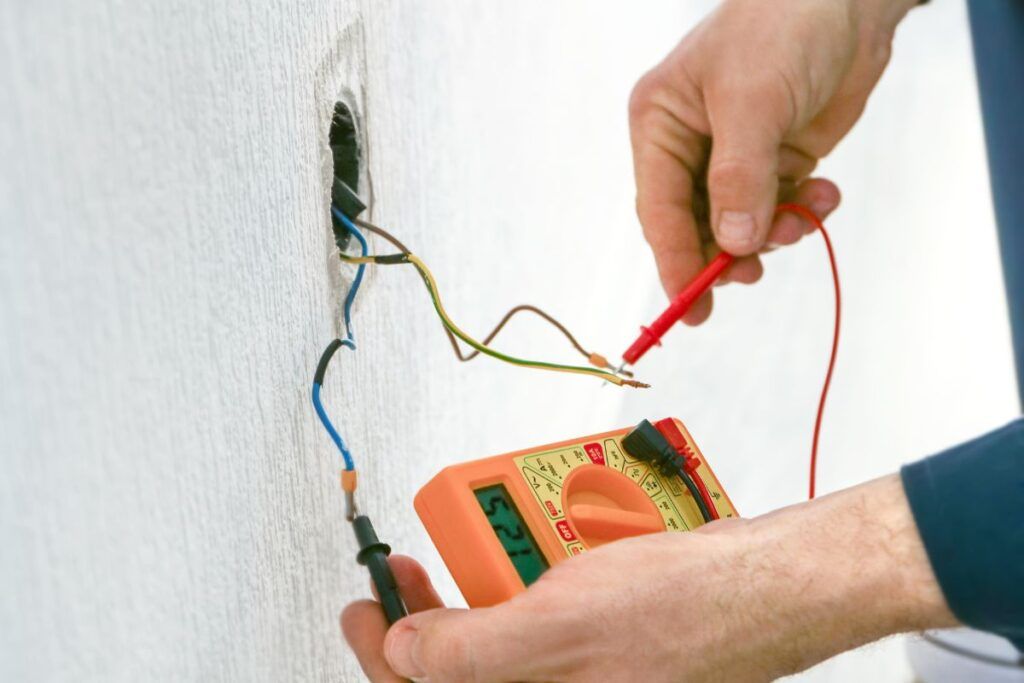Ground wires save you from electrocution by creating an alternate path for current flow during short circuits. Generally, it doesn’t have any power, but what if it has power by any chance?
The ground wire will have power if an electric malfunction or short circuit has occurred. It makes an alternate path for current flow. Other than that, the ground wire will have power if it is connected with hot or neutral wires or if it is a stray voltage. Always use a multimeter to check the same.
A ground wire having power during a short circuit is fine as that is its duty. This guide will share the purpose of ground wire and explore some other causes behind ground wire having power.

Check out our list of top-handpicked products for all your electrical, appliance, and HVAC system needs to keep your home running smoothly.
This post includes some affiliate links.Does the ground wire have power?
We all know that ground wires are used for safety purposes.
They do not have any power or voltage unless they malfunction or have short circuits.
When accidents happen, the current takes an alternate path and flows through the ground wire instead of your body.
So, it saves us from being electrocuted.
However, ground wires do have some millivolts.
But that is very little in amount and not harmful for humans.
But if the voltage is higher, you have some leaded electrical system, which can be very harmful.
Grounded and grounding wires are different.
The grounded wires are the neutral wires that every circuit needs to take back the current to the main power source.
The grounding wire is the ground wire.
Does ground wire carry any electricity?
The ground wire will not carry any electricity.
But, if the circuit breaker has tripped, the ground wire will remove the current from the system and ground it.
The process neutralizes the current to make sure that the current doesn’t cause any damage to any person or appliance that is in contact with the circuit.
The ground wire will only transmit electricity when any fault occurs.

Why would a ground wire have power?
Every circuit has three wires- hot, neutral, and ground.
The hot wire carries current from the main power source.
The neutral carries it from the hot wire, sends the current back to the main power source, and completes the circuit.
The ground wire creates another route for the current to flow during accidents.
People sometimes take neutral and ground to be the same because they eliminate the earth ground bus.
Here are some reasons behind ground wire having power:
Stray voltage
An electricity leak from the hot wire to the neutral or ground wire before traveling through the appliance causes a stray voltage.
These leaks can create issues in your electrical system.
If these wires touch each other by mistake, they can create a short circuit in your system.
The ground line will have power or voltage.
If that happens, then the ground wire will no longer be able to serve its purpose.
As a result, you will get electrocuted if you touch the grounded object.
N-G voltage on voltage drops
Sometimes, N-G voltage on the voltage drops will give the ground wires power.
Though copper is a great conductor of electricity, it still allows resistance build-up if the wire is very long.
If the load increases too much, the long wire connected between the breaker and the service outlet will create a voltage drop in the neutral wire.
This drop will lead to the N-G voltage, where you will find power in the ground wire.
Undersized neutral connection
Most commercial buildings have three-phase circuits.
Suppose you have a 3-phase circuit in an old infrastructure where the neutral connection is undersized between the three phases.
In that case, modern electrical loads will cause an imbalance in the phases.
The neutral lines will have excessive high currents flowing through them.
It further creates neutral-ground voltage, thus adding power to the ground lines.
Tying ground and neutral together
Neutral wires have current flowing through them because they carry the current from the hot wires to send back to the main power.
On the contrary, the ground wires do not have any power or current.
So, if you connect the neutral wire with the ground wire, the ground wire will have power, and it won’t serve its purpose.
Since the neutral wire carries current, connecting it to the ground wire will energize the grounding.
The ground wire will give electric shocks, especially if the appliance is defective, and won’t save you from electrocution.
Also read: Can Ground And Neutral Be Connected Together? (+Possible Hazards)
Tying hot and ground wires together
The same thing will happen here.
Hot wires always have currents as it carries current from the main power source. So, you must handle these wires carefully.
Since hot wires always have currents, joining them with the ground wire makes the ground live, and power starts flowing through them.
As a result, the ground wire will no longer save you from electrocution.
Corroded earth connection
If the ground wire has power, look for corroded earth connections.
Loose ground connections, corroded electrical boxes, and conduits can also bring power to the ground wire.
How do I know whether the ground wire has power?

You can use a multimeter to check whether your ground wire has power or voltage.
Before you measure ground wire power, you need to know certain things.
There are 2 types of ground wires:
- A household AC or alternating current.
- A DC or direct current.
The household ground wire doesn’t have any power holding.
The DC ground wire, however, carries 12.6 volts of current to complete the circuit in the automotive-type wiring system used in cars, motorcycles, and trucks.
To check whether the ground wire of your house has any power or not, consider the following steps:
- First, set the multimeter to the AC to test your ground wire. The multimeter will act as an ammeter to measure the voltage of two points.
- Before starting, do not forget to turn off the breaker on the ground wire circuit you want to test.
- Unscrew the ground wire from the ground post, and pull it out to access the ground wire end.
- Now, turn on the circuit breaker of the particular circuit.
- Attach one probe of the multimeter with the ground wire and another probe with the ground wire electrical post. Since the multimeter will act as an ammeter, it will take up the current reading flowing inside the wires.
- If your ground wire doesn’t have power, there will be zero voltage.
If you wish to check a DC ground wire:
- Remove the wire from the appliance that is connected. It could be a radio or heater.
- Now, set the multimeter at 20 volts DC.
- Connect one probe to the ground wire end and the other to the appliance electrical post.
- Read the reading on the tester screen. Zero voltage is the common result.
- If the reading shows 12.6 volts, there must have been some broken wire for which the ground wire has power.
- You have a shorted ground wire if the reading is between zero and 12.6 volts.
What to do if the ground wire has too much power?
Ground wires are not supposed to have power or current unless there is some short circuit or someone tied up the wires with hot or neutral wires.
When your ground wire has power, it cannot save you from electric shocks if there are any faults in your electrical system.
So, you must call and hire an experienced electrician to fix the problem.
They can find every problem: improper grounding, the corroded ground connection, and everything else.
They will even find out whether the ground wires were tied up with neutral or hot wires or not and bring them to their locations.
The main thing is, you cannot do anything here. You must call a professional to fix the problem.
The only thing you can do is figure out the problem using the multimeter and inform your electrician.
They will come, identify and confirm the issue and fix it soon.
Will a ground wire give a shock?

A ground wire doesn’t have current. So, it won’t give you a shock.
But, if the wire gets energized for some reason, you will receive a shock.
Another situation where the ground wire can give a shock is when it is connected to something else.
The electricity continues as there is a connecting point between you and the ground wire.
But touching it bare when nothing is connected to anything will not give you a shock.
Indeed ground wire doesn’t shock, but you should not touch them bare when the main power is on.
If you must touch any wire, always shut off the circuit and the main and then deal with electrical wires.
It is very dangerous to work with electrical wires without any safety measures, no matter how experienced.
Why is ground wire hot?
When a ground wire becomes hot, the connection in the electrical circuit is really bad.
You have to check for loose and damaged connections inside the circuit.
Mostly the problem happens due to some loose connection.
A loose connection activates the ground wire to save you from electrocution.
The current starts flowing through the ground wire, for which it becomes hot.
You can change the connector and tighten it to ensure the ground wire doesn’t become a hot connection.
A ground wire is a protective element. So, don’t let the wire get hot.
Here are some simple steps to correct the problem:
- If the wire is hot, find the ground wire from the electrical circuit and check how it is set up. Everything is perfect if the wire is connected to the ground rod. If not, the ground wire is becoming live.
- When the ground wire is hot, test for the damage behind the problem. Maybe the electrician did not connect the wires properly with the ground rod. It can damage the wire or the ground rod. In that case, you must replace the ground wire.
- Take your time to tighten the connectors and avoid loose connections. Test each connector and tighten them properly, so they don’t become loose again.
- Once you have checked for damaged and loose connections, re-test your circuit. If everything is fine, there won’t be any issues. If not, the electricity will keep flowing through your ground wire, and this can damage your electrical system.
- While dealing with such things, keep everything well: the circuit box, wires, the ground wire connecting with the rod, switching on the power properly, and other things. Only then run your tests and re-tests.
If you are afraid or naive about dealing with electrical things, consult an experienced electrician to do the job.
They will correct all imperfections and make sure everything is done safely.
Final thoughts
The ground wire is a safety wire that protects us from electrocution during any electrical accidents. When an accident occurs, the current takes an alternate path and flows through the ground wire instead of your body.
So, the ground wire only contains power when there are any accidents. Otherwise, the wire doesn’t have any power.
The ground wire will have power due to corrupted earth connection, undersized neutral connections, stray voltages, loose connections, or it is tied with live or neutral wire.
Whenever you find that the ground wires have power, consult an electrician to fix the problem as soon as possible.
Your duty is whenever you suspect power in your ground wire, check it with a multimeter and inform your electrician about it.
FAQs
What happens if the hot and ground were reversed?
Hot and ground reversed means the positions of hot and ground wires are interchanged.
It will also make the ground wire have power.
If this happens, several issues like a short circuit or melted circuit.
How to solve hot and ground reversed?
Switch off your main and bring the hot and ground wires back to their locations, i.e., ground wire in the ground terminal and hot wire in the hot terminal.
Otherwise, consult an experienced electrician.
How much voltage is normal, and when should I worry?
Typically, 2 volts or less is the normal range in N-G voltage.
You will only need to worry if the reading exceeds the expected range.
Reference: BASICS OF HOME ELECTRICAL WIRING, Electrical wiring Wikipedia.



